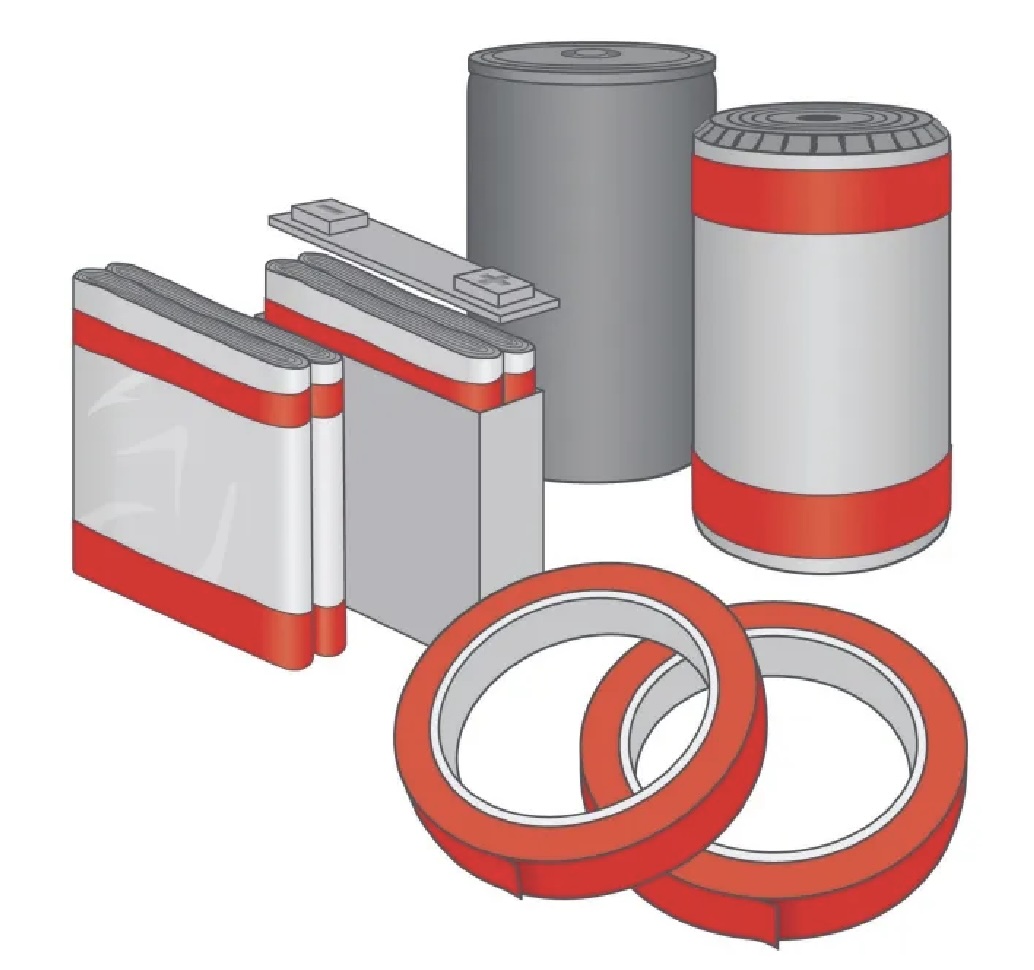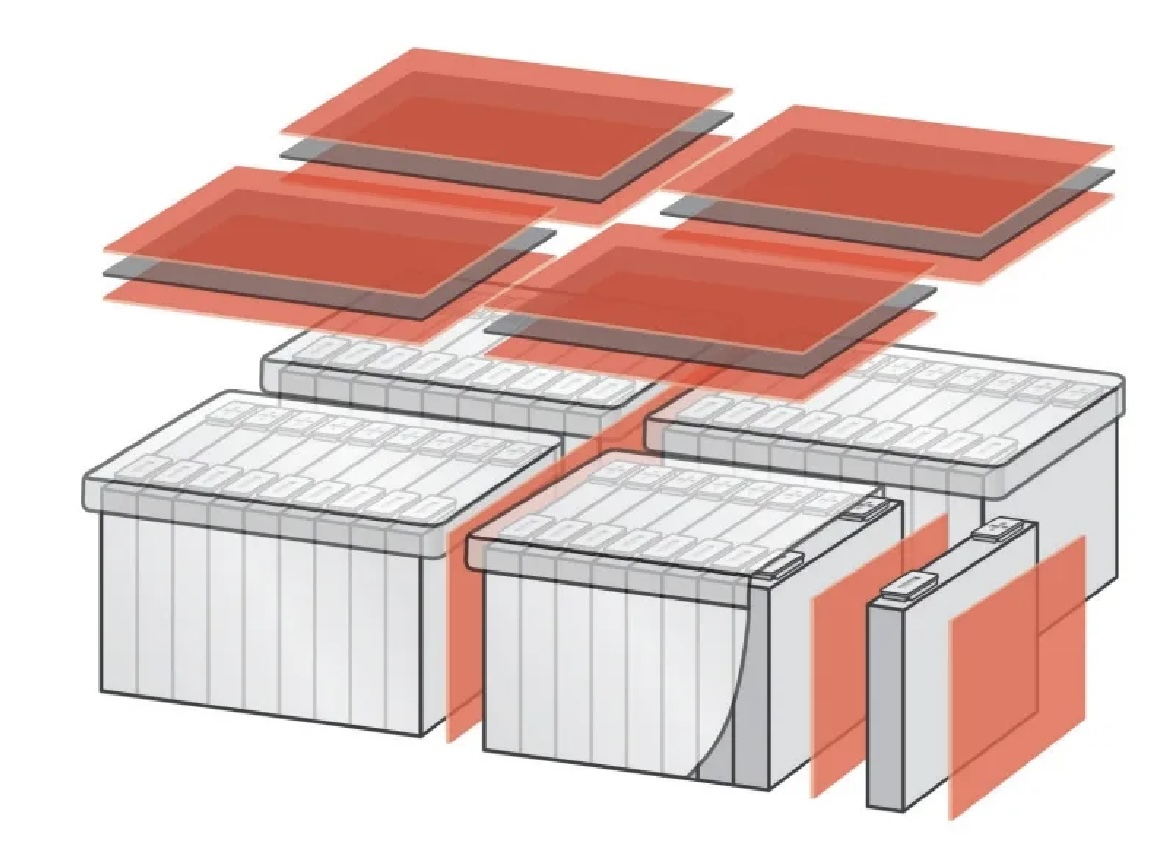PSA Tapes Key to Enhancing EV Battery Design and Production
- Published: August 30, 2024
By Steve DeMaagd, Business Development Manager - E-Mobility, Energy Storage and Automotive, Avery Dennison Performance Tapes
The electric vehicle (EV) industry is poised for massive growth in the years ahead. The global marketplace for EV batteries is projected to nearly quadruple by 20331 to more than $500 billion. To meet these targets, battery manufacturers are working to address critical issues for widening EV adoption by extending vehicle ranges and reducing costs.
Pressure-sensitive adhesive ( PSA) tapes are playing a vital role in addressing these challenges. PSA tape manufacturers are introducing innovative solutions that ensure safety, enhance battery efficiency and optimize manufacturing processes. Equally important, converters are providing critical services such as laminating a wide range of materials, creating multilayer composites, die-cutting to custom shapes and much more.
PSA) tapes are playing a vital role in addressing these challenges. PSA tape manufacturers are introducing innovative solutions that ensure safety, enhance battery efficiency and optimize manufacturing processes. Equally important, converters are providing critical services such as laminating a wide range of materials, creating multilayer composites, die-cutting to custom shapes and much more.
As we look ahead, here are four ways PSA tapes are helping EV battery designers and engineers find solutions and advance the industry.
Streamlining Production
Increasing efficiency of manufacturing operations will help reduce EV battery costs. PSA tapes offer a quick, reliable way to provide structural integrity in EV battery packs. For instance, electrode fixing tapes are a specialized adhesive tape used to bind multilayer electrode constructions consisting of current collector foils, anode and cathode material and separator films in EV battery cells.
Use of PSA tapes supports efficient manufacturing in several ways. The tapes create an immediate bond that eliminates cure times while ensuring a continuous bond across large surface areas. Unlike liquid coatings, there is no need for mixing nozzles or other equipment.
PSA tapes also offer a slim profile that saves space. While liquid coatings typically must be applied at a thickness of at least 150 microns, PSA tapes can achieve the same level of dielectric strength at half the thickness. Lighter than mechanical fastening systems, PSA tapes help reduce overall vehicle weight — a key priority for OEMs.
PSA tapes also offer financial advantages. EV manufacturers can qualify for Inflation Reduction Act incentives if 50 percent of components are produced in the U.S. or one of 20 countries with a free-trade agreement. Look for manufacturers that meet this standard.
Reducing Flammability
 Flammability and thermal runaway are key challenges for EV battery manufacturers. To limit flammability, manufacturers are using acrylic- and silicone-based adhesives with flame-retardant properties that meet UL® 94 V-0 and additional flame requirements. Solutions are available that combine these adhesives with polyester tape in single- or double-sided options.
Flammability and thermal runaway are key challenges for EV battery manufacturers. To limit flammability, manufacturers are using acrylic- and silicone-based adhesives with flame-retardant properties that meet UL® 94 V-0 and additional flame requirements. Solutions are available that combine these adhesives with polyester tape in single- or double-sided options.
These tapes also provide a solution for preventing thermal runaway events in which fire spreads from cell to cell in the battery pack. Engineers and designers depend on PSA tapes in cylinder, pouch and prismatic designs because they:
- Offer compatibility with cylinder and pouch cell battery designs commonly used in North America;
- Provide flame-retardant properties when applied for cell-to-cell bonding or compression padding;
- Establish secure bonds without introducing materials that could fuel an ongoing fire within the battery; and
- Deliver versatile bonding solutions for attaching mica, ceramic fibers, aerogels and other materials that are crucial for safeguarding cells — and passengers.
These adhesives support tailored solutions that work with substrates used today and those that will emerge in the future.
Protecting Battery Parts to Support Reliability
PSA tapes are commonly used to protect key battery components, reduce the risk of electric failures and improve battery lifespan. For instance, manufacturers place foams backed with PSA tapes as compression pads that protect battery cells from impact, movement or swelling. These flame-retardant tapes are also designed to help protect batteries against fires when there are flame or electrical arcing incidents.
PSA tapes are commonly used for cell cushioning for several reasons. They require no cure time while providing immediate structural strength. Unlike liquid adhesives, PSA tapes serve as an assembly aid and bonding solution while providing full-coverage adhesion between the metalized polyester pouch cell and cushion foam.
PSA tapes are also used to protect battery cells by:
- Providing electrical insulation and flame resistance for busbars — flexible printed circuits that enhance cost savings and safety;
- Supporting optimal battery temperatures by bonding thermal interface materials (TIMs) to heat sinks or chiller plate materials to facilitate heat transfer. PSA tapes also bond flexible printed heater films that keep cells warm to prevent potential damage during charging; and
- Preventing water intrusion and limiting noise, vibration and harshness by bonding gasket materials such as foams and fibers. Single-coated tapes provide a thin and instant bonding solution for gasket materials. Double-coated tapes can be used to add dimensional stability to gaskets and prevent them from stretching during application.
Enhancing Dielectric Strength
Dielectric strength is critical to reliable performance of EV batteries because it helps prevent electrical breakdowns. PSA tapes offer a durable solution to enhance the dielectric strength of EV battery packs when used for cell-to-cell bonding, compression padding and cell wrapping applications.
PSA tapes that include dielectric films are also used to apply electrical insulation and cell wrappings that are critical to protecting batteries from damage and extending battery life. These protective layers around individual battery cells provide the electric insulation the cells require to function effectively. These tapes offer dual dielectric and flame protection. They are also versatile and can be applied to various surfaces, including rigid materials such as aluminum chill plates and other metal structures. Materials and adhesives should be tested for breakdown voltage and dielectric strength requirements using GB/T 1408.1-2016 and ASTM D3755 test methods.
Recently introduced con-formable dielectric tapes designed for EV batteries are an important advancement. The single-sided tape offers enhanced stretching capabilities, which promotes better bonding with contoured and raised surfaces. The facestock prevents electrical arcing and the tape retains its thickness while conforming to sharp corners without splitting.
The Road Ahead
PSA tapes provide solutions for some of the most significant challenges OEMs and battery pack manufacturers encounter as they look to improve their technologies. There are many challenges - and opportunities - coming for the converter and tape industries. By collaborating with OEMs and suppliers, we can overcome the engineering hurdles and design requirements that support the successful transition to EV technology.
About the Author
Steve DeMaagd is a business development manager, E-Mobility, Energy Storage and Automotive, Avery Dennison Performance Tapes. Based in Michigan, Steve works with companies across the Automotive value chain to generate and execute opportunities featuring PSA tapes. He may be contacted at steve.demaagd@averydennison.com or through LinkedIn.












